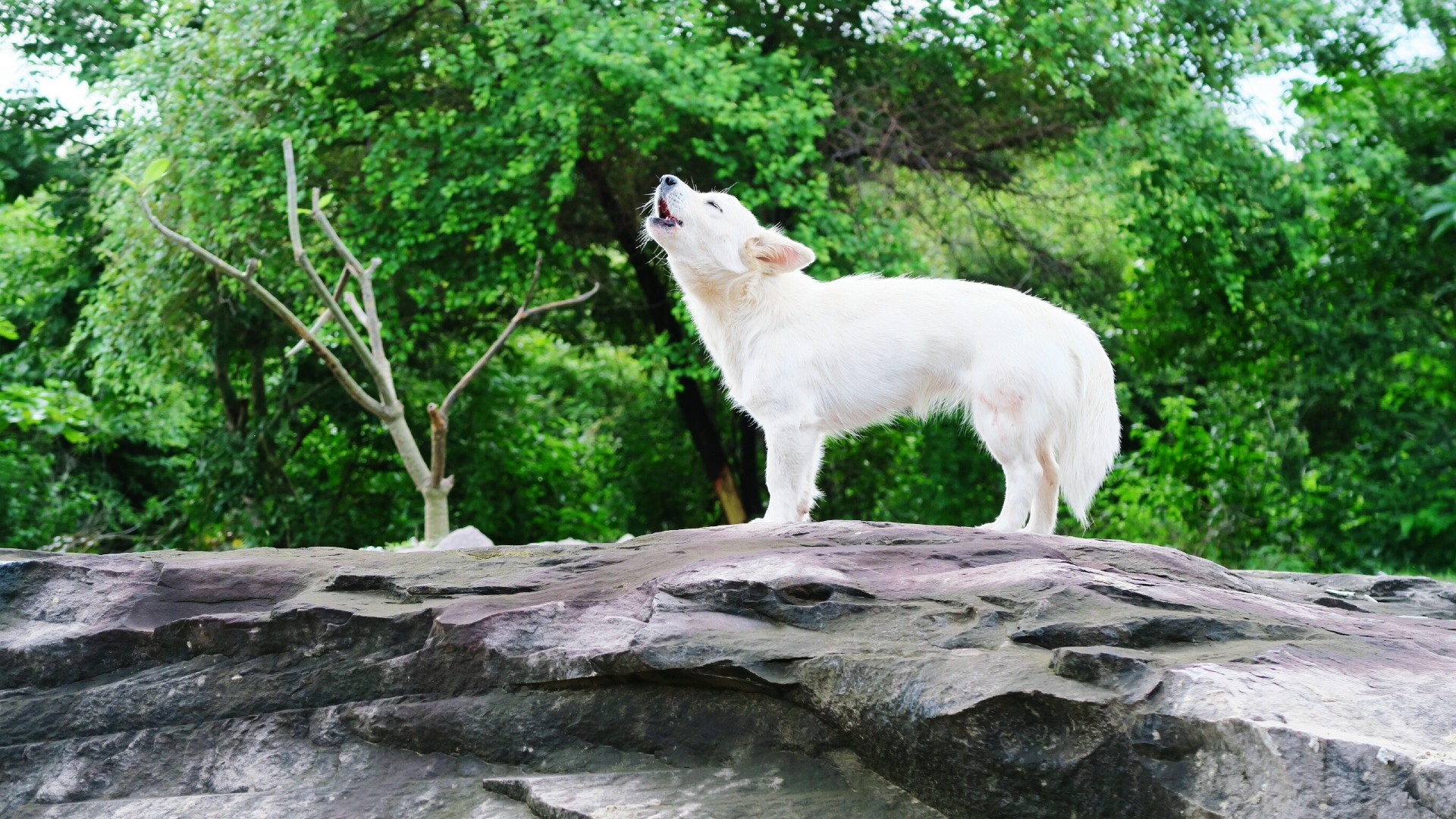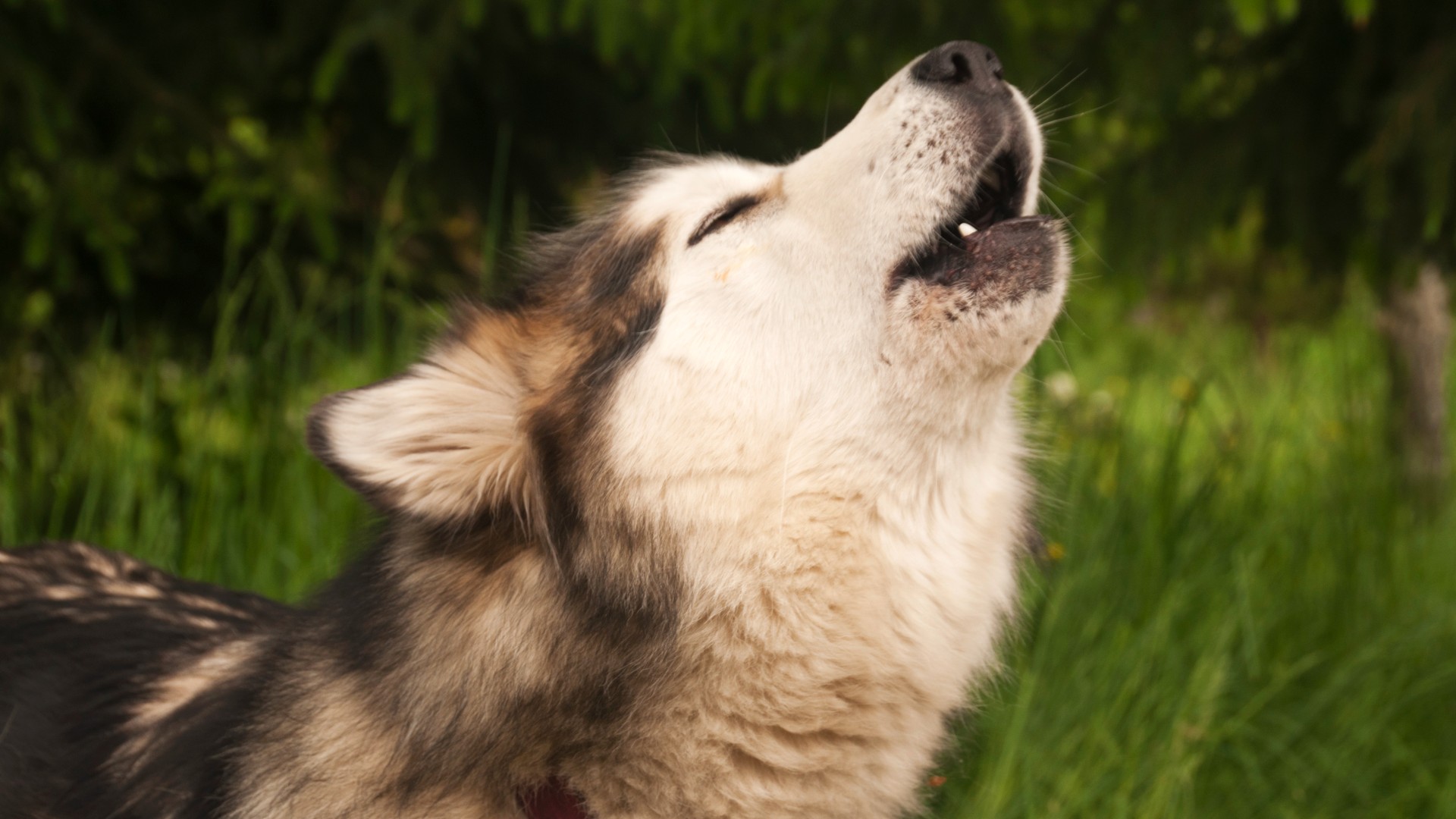Why do dogs howl? Find out why your pooch is so vocal
We answer the question, 'why do dogs howl?' Plus, we let you know which breeds howl the most and how to help them quieten down

'Why do dogs howl?' is a question that has been asked by children and adults alike ever since wolves and humans first started living side-by-side over a million years ago. And as the wolf species began to evolve to give us the domestic dogs we now affectionately call 'man's best friend', we've only grown more curious about this strange behavior.
Howling is one of many forms of communication that dogs use, and learning to decipher it can help you better understand what your dog is trying to tell you and what they need. Some howls are nothing to worry about, while others may be a sign that your dog is struggling with separation anxiety or is feeling unwell.
If you’ve ever found yourself wondering ‘why do dogs howl?’ then you’re in the right place. We’ll be giving you the scoop on all of the common and not so common reasons for howling, as well as identifying which breeds are the most likely to howl, and giving you some tips on what to do if your dog’s howling becomes excessive.
Why do dogs howl? It’s in their blood!
First things first: howling is just one of those primitive behaviors that goes back hundreds of thousands of years as one of our favorite animals went from wolf to dog.
Wolves howl to communicate with members of their pack that may be spread over vast distances, and being descendants of wolves, it’s an instinct that has been passed down over generations, and is implanted firmly in your dog’s genetic memory.
Howls are primitive and innate, so a part of the reason your dog howls is that it’s a part of their lineage. But just as wolves have their reasons for howling, so too do domestic dogs. Here are a few of the most common...
1. As a way of communicating

Your dog has a lot he wants to tell his human family, but unlike you, he can’t just open his mouth and spill the beans. The next best thing? Howling! But to make matters a little more complicated, every howl tells a different story:
Get the best advice, tips and top tech for your beloved Pets
2. Look what I found
In much the same way as a cat will meow excitedly when they bring home a mouse, and want to show off their kill, a dog will often howl when they find a new treasure that captures their attention. Howling to get you to come over and look at something they’ve found is their way of showing you how proud they are of their discovery.
3. I’m paying attention to my environment
You may have heard dogs in your neighborhood howling back and forth with each other, or noticed your dog howl when they hear a police siren or other loud sound. Howling when they hear other dogs vocalizing or high-pitched sounds is your dog’s way of showing you that they’re alert and ready to respond if there’s any danger.
4. I’d love some food or cuddles right now
If your pooch knows that some of the best dog food is lurking behind those pantry doors, or they simply want some love and affection, howling is their way of letting you know. After all, nothing captures a pet parent’s attention quite like incessant howling.
5. This is my home, and I’m not afraid to protect it
Some dogs may use howling as a way to guard their territory, warning off visitors and letting other dogs know that this particular patch of land is already claimed. This is your dog’s way of alerting you that other animals may be about to make themselves known, and that their presence has been detected.
6. Because they’re sick
While not all dogs will howl when they’re unwell, some will, so it’s important to notice if your dog is howling more than usual, or if they suddenly start howling, having never engaged in that behavior before.
A sudden injury, abdominal pain, or another form of discomfort can all be reasons for howling, as can neurological issues such as Canine Cognitive Dysfunction. Just like us, some furkids will get a form of doggy dementia that can cause them to become confused and disorientated, and howling can be a way of signaling their distress.
If you notice anything unusual about your dog’s howling, or you’re worried they may be unwell, arrange an urgent appointment with your furkid’s vet, who will be able to rule out any underlying medical issues.
7. Separation anxiety
Dealing with separation anxiety in dogs is a common problem for a lot of pet parents, and it’s a tricky one because, unless you have one of the best pet cameras set up at home, you may not be aware that your dog is howling while you’re away until one of the neighbors points it out.
If you find out your dog has been howling whenever you’re out of the house, or you notice they howl whenever they’re not able to quickly locate you, there’s a good chance they’re suffering from separation anxiety.
Learning how to reduce separation anxiety in dogs can help put an end to howling, and although it may feel challenging at first, if you persevere you’ll end up with a much happier (and quieter!) dog.
Some dog breeds howl more than others

It probably won’t come as a surprise that some dogs are more prone to howling than others, and they tend to fall into two groups: hounds, and those that are closely related to wolves.
Hunting dogs, like Bloodhounds, Beagles, and Basset Hounds, have evolved to howl to let their hunting group know that they’re hot on the trail of prey, or that they’ve already trapped it. These dogs love to vocalize 24/7, so if you’re after a quiet dog, you’ll want to steer clear of this group.
Dogs that are closely related to wolves and grew up in harsh and cold climates are also howlers, and this includes Siberian Huskies, Malamutes, the American Eskimo Dog, and any other sled dog mix. These are adventurous working dogs who are used to pulling sleighs and enjoy living in packs, so howling is frequently used as a form of communication.
What to do about excessive howling
Depending on the reason behind your dog’s howling, there are a few things you can do to help put a stop to it.
Separation anxiety: If your dog is howling when they’re left alone, try leaving them with some of the best dog toys to help engage their mind and keep them occupied. Puzzles can be great boredom busters and Kong toys, many of which can be stuffed with food, are always super popular.
You can also try a holistic device like the RelaxoPet Pro, which uses high-frequency sounds to help soothe your dog when they're feeling stressed out or anxious.
Attention-seeking: Howling that’s the result of attention-seeking behavior needs to be ignored. The minute your dog starts howling, turn your back to them, and move away. Don’t scold them, but don’t look at them or touch them either. Any kind of attention, whether positive or negative, can be seen as a reward by a dog, so you will want to ensure you’re not giving your dog what they want.
Use the best dog treats to reward your hound for times when they're quiet. Whenever your pup is being good and not making a noise, give them a treat. It’s also worth spending time teaching your dog to respond to commands.
Start by using the command ‘speak’ to get your dog to bark or howl. Praise them when they makes the noise, but don’t give them a reward. Then use a command such as ‘quiet’ and when your dog goes silent, say ‘good’ and reward them with a treat.
If your dog’s howling becomes a problem, speak to your pup’s vet, and consider looking for a certified professional dog trainer who can work with your dog one-on-one.

Kathryn is a freelance writer who has been a member of the PetsRadar family since it launched in 2020. Highly experienced in her field, she's driven by a desire to provide pet parents with accurate, timely, and informative content that enables them to provide their fur friends with everything they need to thrive.
Kathryn works closely with vets and trainers to ensure all articles offer the most up-to-date information across a range of pet-related fields, from insights into health and behavior issues to tips on products and training.
When she’s not busy crafting the perfect sentence for her features, buying guides and news pieces, she can be found hanging out with her family (which includes one super sassy cat and a kitten), drinking copious amounts of Jasmine tea and reading all the books.
She has written for a range of publications, including Fit&Well, Top Ten Reviews, LiveScience, Goodto, and Product Hunt.
